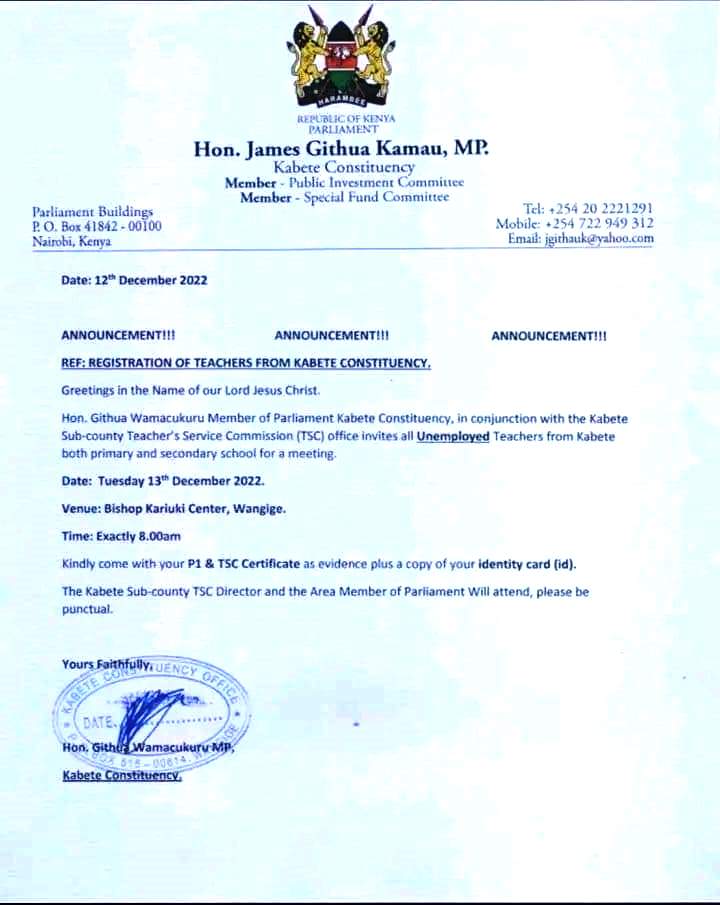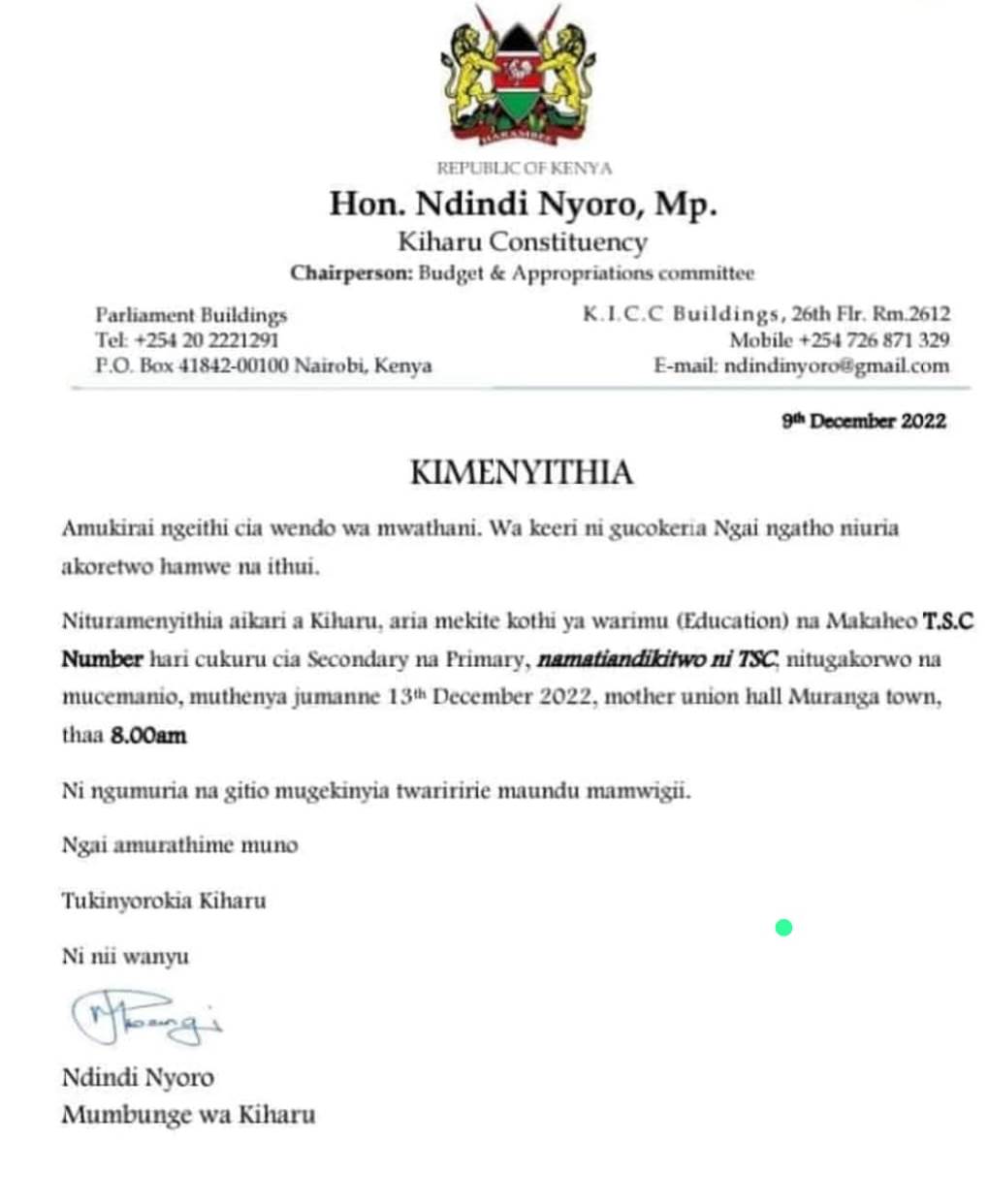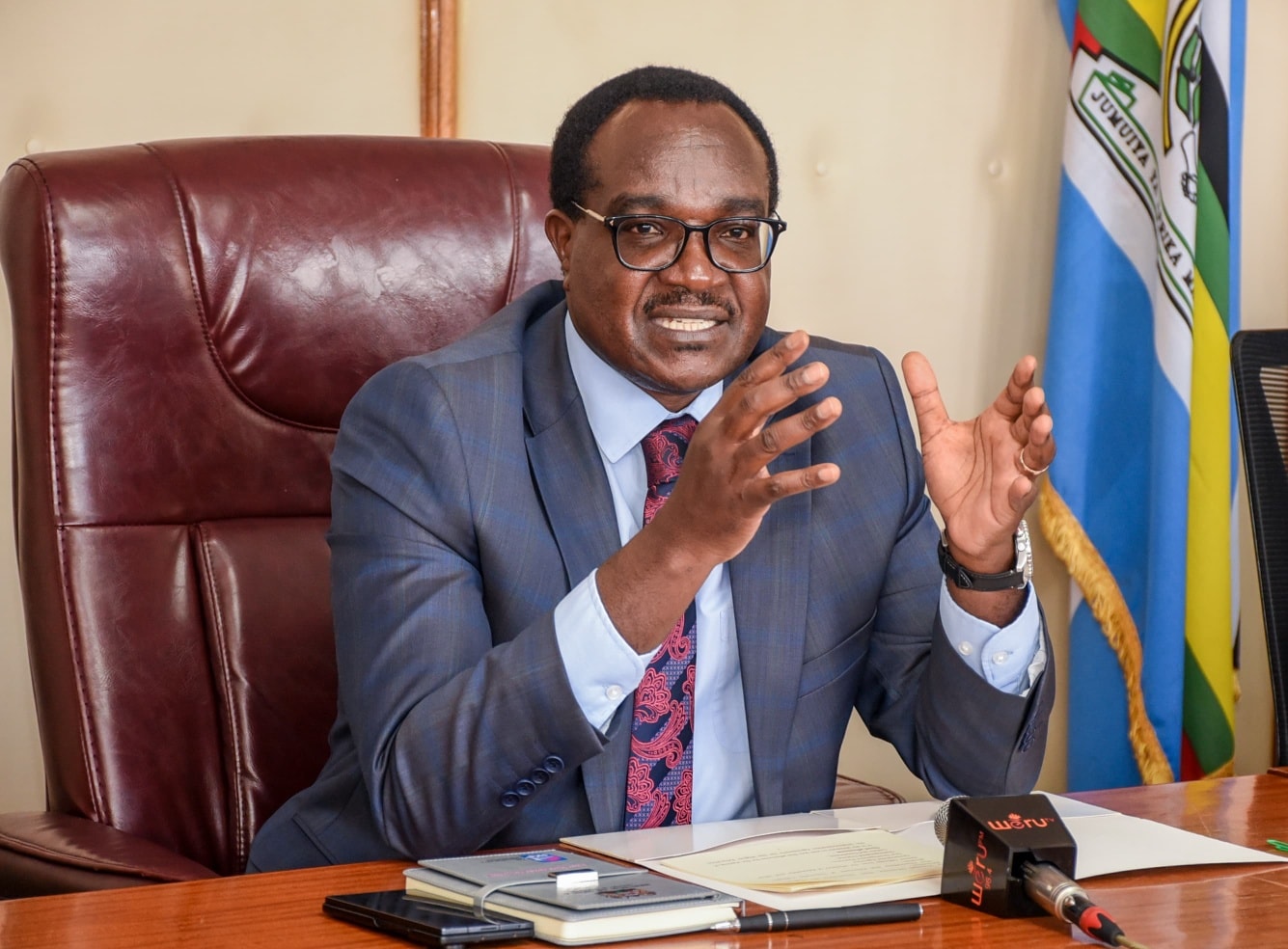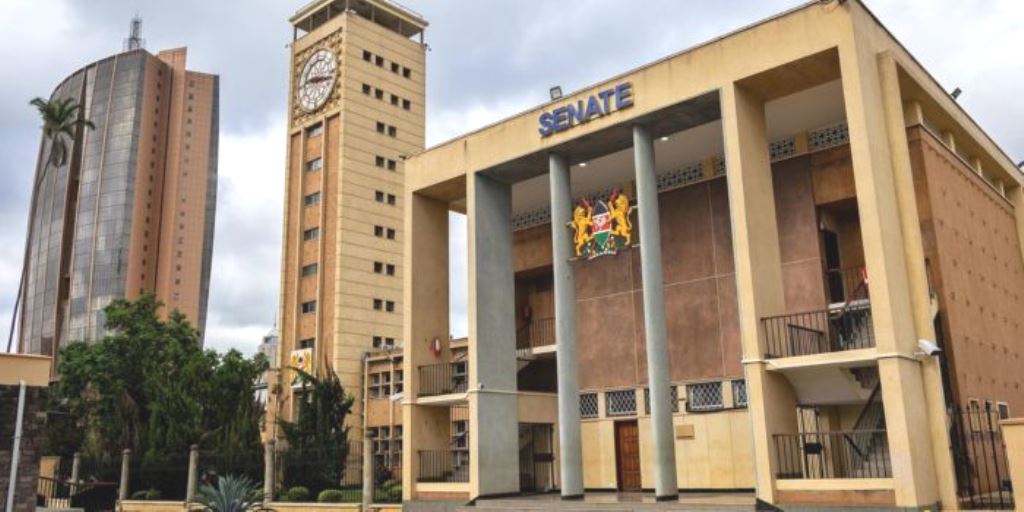By Roy Hezron
The recent scenarios where a number of Members of Parliament (MPs) have called for meetings with unemployed teachers, days after the Teachers Service Commission (TSC) advertised vacancies for 30,550 teachers, has raised concerns on whether they will influence the final list of recruited teachers in January 2023.
They has also raised concerns on whether the recruitment will adhere to the Commission’s guidelines and policies or the will of politicians will carry the day.
For instance, in Kiambu County where TSC declared a total of 846 positions; Kabete MP Hon. James Githua Kamau invited all unemployed teachers of both primary and secondary schools in his Kabete constituency for a meeting on December 13, 2022 – just two days after the TSC advertisement.

In his letter dated December 12, 2022 Githua requested the teachers to come with their certificates as proof disclosing that the Kabete Sub-County TSC Director will attend the meeting.
“Kindly come with your P1 and TSC Certificates as evidence plus a copy of your Identity Card. The Kabete Sub-County TSC Director and Area Member of Parliament will attend,” reads the letter in part.
In Murang’a County where TSC declared 788 vacant positions, Kiharu MP who is also the Chairperson of Budget and Appropriation Committee Hon. Ndindi Nyoro; through a letter dated December 9, 2022 addressed in his native Kikuyu language, called for a similar meeting on December 13, 2022.

An officer in Baringo Central MP’s office on the other hand disclosed that the recruitment of teachers this time will be unique in the sense that TSC will partner with MPs across all the 290 Constituencies in the process; a move intended to erase middlemen and corrupt officials who sell both Primary and Secondary School teachers’ slots.
The officer disclosed that in Baringo Central, MP Hon. Kandie Joshua Chepyegon will follow merit in the process, in the sense that those who finished university and Colleges early will be given priority and having more names of the possible Candidates through his office which will be presented to the TSC.
TSC advertised for the positions on December 10, 2022 whereby 9,000 teachers will be employed on permanent and pensionable terms while 21,550 teachers will be employed on internship terms across all the 47 counties.
Out of these, 9,000 teachers will be posted to Junior Secondary Schools (JSSs) on permanent and pensionable terms, 1,000 teachers will be posted to primary schools on permanent and pensionable terms, 21,550 interns will be posted to JSSs and 4,000 interns who will be absorbed in primary schools.
Recently, unemployed teachers especially those who have served under school Boards of Management (BoMs) in both primary and secondary schools for a long period of time, have decried unfairness regarding the TSC score guide which is always released by the Commission to guide the recruitment process.
For instance, during this year’s July recruitment, a considerable number of unemployed primary school teachers were disappointed following the Commission’s move to put Primary Teacher Education (PTE) teachers who graduated in 2015 and before in the same bracket and awarded them 35 marks.
This implies that those who graduated in the year 2000 have the same graduation year marks with those who graduated in 2015.
Those who graduated in 2016 were awarded 30 marks, 2017 awarded 25 marks, 2018 awarded 20 marks, 2019 awarded 15 marks and 2020 awarded 10 marks. Those who graduated in 2021 and after were awarded 5 marks.
During a five-day training of TSC Sub-county Directors in November this year on the Secondary Education Quality Improvement Programme (SEQIP) the Sub-County bosses urged the Commission to improve on its transparency, equity and fairness during the teacher recruitment process.
This followed a confusion that occurred during the July recruitment when the Commission decided to apply an affirmative action plan during the recruitment exercise which saw 13,000 teachers being recruited.
The well-intentioned efforts by the Commission to achieve the stipulated 5 per cent threshold on teachers classified under People Living with Disabilities (PLWDs) within its ranks through the hiring exercise seemed to have put County Directors, Sub-County Directors and Curriculum Support Officers in an awkward position.
The officers were advised by the Commission to ensure that only those who present disability cards obtained from the National Council for Persons with Disabilities (NCPD) were eligible for consideration under this affirmative action.
Similarly, the Commission directed the officers that where an applicant with disability is within the shortlisted five in the merit list, then such a candidate should be considered for employment even though the others within the list had better scores.
Field officers raised questions over the wisdom behind the requirement as it ridiculed the whole recruitment exercise. Those who spoke to Education News by then in confidence wondered why they were required to interview applicants when the results were already predetermined.
Despite the fact that there are a number of challenges that at times rock TSC’s recruitment process, MPs being indirectly involved in the process for the first time in the country’s history will jeopardize the process even more; because TSC is an Independent Commission established under the Constitution of Kenya to manage human resource within the education sector.
Some of the MPs have been heard threatening not to allow ‘foreigners’ from getting jobs in their sub-counties and that the slots are only for residents.
Questions have also emerged on the presence of TSC field officers in those meetings, with some wondering what role they play in such gatherings.
Further, it’s not also clear what will happen to the TSC data bank which the Commission prepared during this year’s July recruitment.
During the recruitment process, TSC instructed its County Directors to develop a data bank for interviewed teachers for secondary schools which will guide the Commission to replace teachers who will exit the service within the 2022/2023 Financial Year (FY).
From the list of five (5) shortlisted and interviewed candidates per vacancy in every secondary school in the country, the School Selection panel – which is the BoM – were required to develop a vacancy specific merit list.
In the guidelines for recruitment of post-primary teachers on permanent and pensionable terms outlined under Circular No. 9/2022 dated June 30, 2022 released by the Commission’s Secretary and Chief Executive Officer (CEO) Dr. Nancy Macharia, the merit list shall be used in TSC subsequent and similar recruitment in the County.
“The Merit List shall be used in the subsequent recruitment processes involving a similar vacancy in the County within the financial year or as directed by the Commission from time to time,” said Dr. Macharia in the Circular.
This implies that any future recruitment within 2022/2023 FY that is between July 2022 and June 2023, priority will be given to those who are listed in the data bank; without necessarily TSC having to do a fresh hiring exercise as was the case before.
According to the guidelines, after developing the vacancy specific merit list, the school selection panels shall be required to submit the list to TSC Sub-County Directors, who will submit the list for compilation of subjects-specific merit list to the County Directors to generate a databank for the County, which shall be used to fill subject-specific vacancies in subsequent recruitment processes within the FY.
The TSC County Director shall then be required to forward the subject specific merit list to the Regional Director who will compile the Regional subject specific merit lists for onward submission to TSC Director Staffing at the Headquarters.
“This data bank of interviewed candidates shall be used to replace those exiting service within the Financial Year. The subject specific data bank shall be used to fill vacancies arising from the County, Region and nationally within the Financial Year,” said Dr. Macharia in the Circular.
The Commission notes further that where candidates are exhausted from the subject-specific County data bank, replacement shall be done using the Regional data bank; and where candidates are exhausted within a region, vacancies shall be filled using the subject-specific National data bank.






